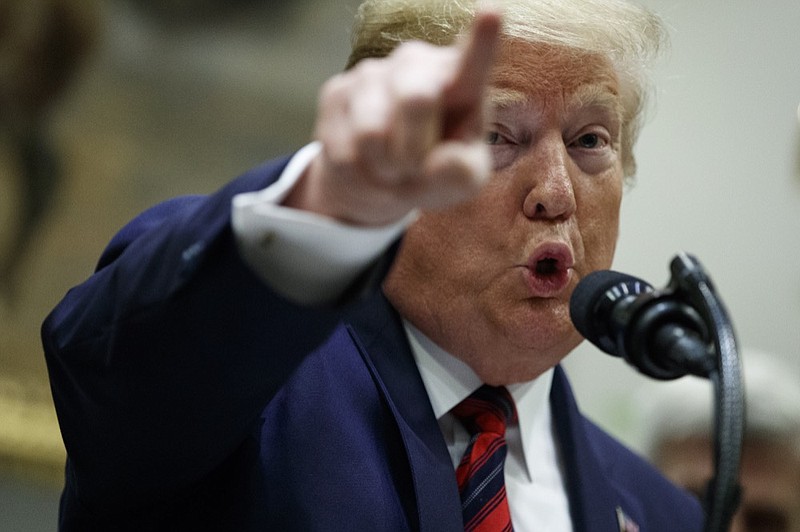So much for 'art' of the deal
It's still the economy, stupid - as campaign strategist James Carville harped during Bill Clinton's successful 1992 presidential campaign against sitting president George H.W. Bush.
Carville's message was simple: Voters care first, second and third about the economy, as understood by how they are feeling about their own financial well-being. Everything else is just noise.
So let's look at what we keep being told is a booming economy under President Donald Trump.
The most recent jobs report found the unemployment rate at 3.6%, its lowest mark in 50 years. Yet most Americans aren't feeling it. They have falling household income, skyrocketing health and insurance costs, and they didn't get the extra jingle of tax break pocket change that the top 1 percent got.
According to Gallup, Americans' confidence in the economy dipped in March and April after surging in February, shortly after the end of the latest government shutdown. Gallup's Economic Confidence Index is now +21. The index has a theoretical maximum of +100, if all Americans believe the economy is excellent or good and getting better.
The poll also found hope somewhat stymied: 49% perceive that economic conditions are getting better, while 44% think they are getting worse.
And all of those numbers were collected before our genius president - who for decades told us he was a master dealmaker even while claiming $1.17 billion in losses on his own tax returns from 1985 to 1994- threatened to hike the 10% tariff on Chinese imports to 25%.
The tariff talk - expected to affect nearly 6,000 products and parts, including many consumer items such as furniture, clothing, electronics, handbags, luggage, hardware, shampoo, perfume, dishes, bedsheets, bicycles, cars, meat and cereal - resulted in four straight days of stock market losses.
David French, senior vice president of government relations for the National Retail Federation, was not kind.
"A sudden tariff increase with less than a week's notice would severely disrupt U.S. businesses, especially small companies that have limited resources to mitigate the impact," he said. "American consumers will face higher prices, and U.S. jobs will be lost."
Look at what voters want
What else are voters interested in?
Health care - the pocketbook issue that is costing many working Americans an average of $4,000 a year in deductibles - and climate change, which is threatening not just their purses but even their homes and businesses when severe weather strikes with increasing regularity.
An April Monmouth University poll of Democratic voters in Iowa, where primary candidates already are strollling the sidewalks and canvassing in cafes, found that 51% of voters listed health care among their top two "most important" issues. Second on the list was climate change and global warming with 17%. It's also important to note that environment and pollution made the top two list of 12% of voters.
The climate change uptick marks a big shift from the last presidential election in 2016, a year when the subject didn't get a single question during the debates. In answer to how much Democrats care that the party nominate someone who supports the Green New Deal, 31% said "very important" and another 41% said "somewhat important."
Supporting "Medicare for all" got a similar response: 49% said very important, and 33% said somewhat important.
How important is it that Democrats nominate someone who supports impeaching Donald Trump? Not so much: 51% said it is "not important." But nearly two thirds said they would prefer a Democrat with whom they didn't agree but thought would be a stronger candidate against Trump.
Yes, collusion: Rinse and repeat
Remember that Russia collusion thing Trump said didn't happen?
Well, it's happening again.
Rudolph W. Giuliani has announced to the world that he is going to Ukraine to pressure that country's government to use its official resources to assist in President Trump's reelection effort. How? By mounting an investigation he hopes will produce dirt on Joe Biden.
Hey, why not? It worked out great for Trump and Russia in 2016.
Trump asked for emails belonging to Hillary Clinton and got them, via WikiLeaks. His campaign team was offered dirt on Clinton, and his people fell all over each other trying to get it. Plus, he got away with it. So why not rinse and repeat?
Giuliani says he'll be soliciting information on the involvement of former Vice President Joseph R. Biden Jr.'s son in a gas company owned by a Ukrainian oligarch. Plus, he'll be asking for information on the "origin of the special counsel's investigation into Russia's interference in the 2016 election."
"We're not meddling in an election, we're meddling in an investigation, which we have a right to do," Giuliani was quoted in The New York Times on Thursday. "There's nothing illegal about it. Somebody could say it's improper. And this isn't foreign policy - I'm asking them to do an investigation that they're doing already and that other people are telling them to stop. And I'm going to give them reasons why they shouldn't stop it because that information will be very, very helpful to my client, and may turn out to be helpful to my government."
You just can't make this stuff up.
